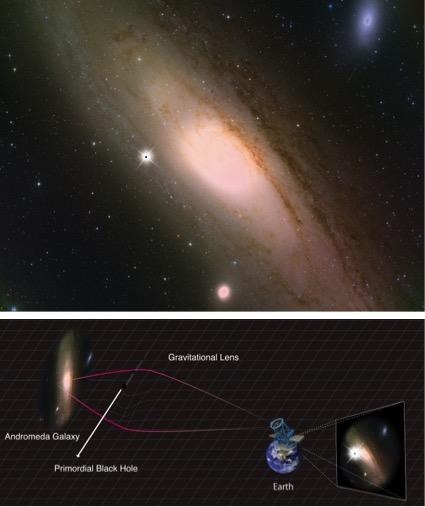Apr 3 2019
An international research team has placed a theory proposed by the late Stephen Hawking to its toughest test until now. The test results have eliminated the possibility of dark matter being mostly formed of primordial black holes smaller than one-tenth of 1 mm. The research has been reported in Nature Astronomy this week.
 As the Subaru Telescope on Earth looks at the Andromeda galaxy, a star in Andromeda will become significantly brighter if a primordial black hole passes in front of the star. As the primordial black hole continues to move out of alignment, the star will also turn dimmer (go back to its original brightness). (Image credit: Kavli IPMU)
As the Subaru Telescope on Earth looks at the Andromeda galaxy, a star in Andromeda will become significantly brighter if a primordial black hole passes in front of the star. As the primordial black hole continues to move out of alignment, the star will also turn dimmer (go back to its original brightness). (Image credit: Kavli IPMU)
Researchers are well aware that dark matter constitutes 85% of the matter in the Universe. Stars in the Milky Way galaxy are prevented from flying apart due to the gravitational force of this dark matter. Yet, efforts toward detecting such dark matter particles with underground experiments, or accelerator experiments involving the largest accelerator in the world—the Large Hadron Collider—have failed thus far.
Due to this, scientists have turned toward Hawking’s 1974 theory of the occurrence of primordial black holes, which emerged immediately after the Big Bang, and his hypothesis that they could constitute a large part of the elusive dark matter, which researchers are trying to find out currently.
An international research team, under the guidance of Principal Investigator Masahiro Takada, PhD candidate student Hiroko Niikura, Professor Naoki Yasuda, all from the Kavli Institute for the Physics and Mathematics of the Universe, and including scientists from Japan, India, and the United States, has made use of the gravitational lensing effect to find out primordial black holes between Earth and the Andromeda galaxy. Gravitational lensing is an effect proposed first by Albert Einstein and manifests itself as the bending of light rays received from a distant object (for example, a star) as a result of the gravitational effect of an intervening massive object such as a primordial black hole. In extreme instances, light bending such as this makes the background star to seem considerably brighter than it originally is.
However, gravitational lensing effects are events that are extremely rare as they need a star in the Andromeda galaxy, a primordial black hole that acts as the gravitational lens, and an observer on Earth to be precisely in line with one another. Hence, the scientists used the Hyper Suprime-Cam digital camera on the Subaru telescope in Hawaii to increases the likelihood of spotting an event. This camera has the potential to capture the complete image of the Andromeda galaxy in one shot. The researchers took the fact of how fast primordial black holes are anticipated to move in interstellar space into account and captured multiple images to be in a position to catch the flicker of a star when it brightens for a period of a few minutes to hours by the effect of gravitational lensing.
The researchers analyzed data from 190 sequential images of the Andromeda galaxy captured over a period of seven hours on one clear night for potential gravitational lensing events. In dark matter contains primordial black holes of a specified mass, masses lighter than the moon in this case, the scientists expected to discover roughly 1000 events. However, following careful analyses, they could only find one case. The team’s outcomes demonstrated that primordial black holes can contribute not more than 0.1% of all dark matter mass. Hence, it is not likely for the theory to be true.
Currently, the team is planning to further develop its investigation of the Andromeda galaxy. One new theory they will analyze is to verify whether binary black holes discovered by gravitational wave detector LIGO are actually primordial black holes.